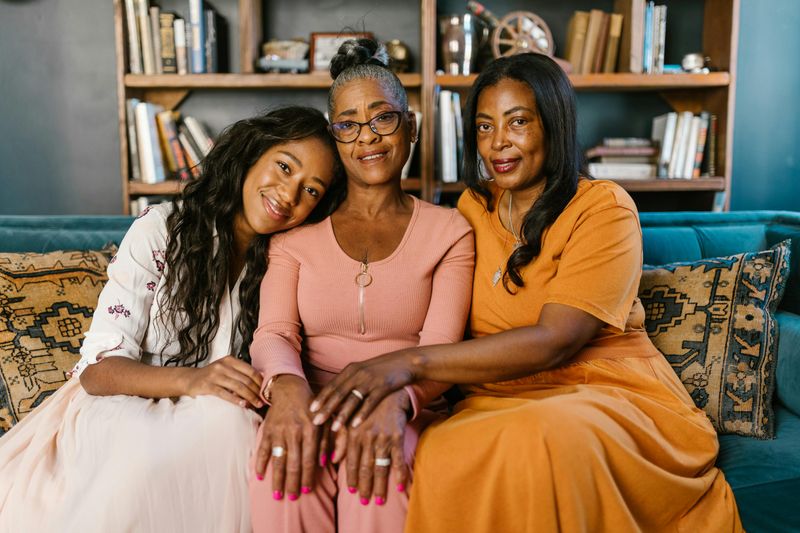What It Really Feels Like to Be the Black Sheep in Your Family

Every family has one — the person who never quite fit into the mold everyone else seemed perfectly happy to squeeze into. Maybe you were too outspoken, too independent, or just too different for the family’s comfort. Whatever the reason, you’ve likely spent years feeling like the “odd one out” at every gathering.
1. Being the Family’s “Problem” Child—Even When You’re Not Doing Anything Wrong

Everyone else seems to glide through family life while you’re branded the troublemaker. Despite your best intentions, misunderstandings and judgments pile up, casting shadows over simple actions. Each move is scrutinized with a magnifying glass that others are spared from.
Yet, it’s not always about the obvious mistakes—often, it’s the differing opinions or lifestyles that spark the label. You might pursue a path that doesn’t align with familial expectations, becoming the unwitting rebel. The role of the “problem” child can be a vicious cycle, hard to break once it’s started.
However, this label can foster resilience, teaching you to stand firm in your choices. Though it may feel like the world is against you at times, every challenge adds a layer of strength and independence. The path is rugged but rewarding.
2. Having Your Choices Questioned at Every Turn

When you decide to veer off the beaten path, expect the questions. It’s not just curiosity but skepticism wrapped in concern that greets your every decision. Whether it’s your career or your relationships, unsolicited advice becomes a constant companion.
This scrutiny often stems from love, but it can feel suffocating. You’re left second-guessing decisions that once felt certain. The pressure to conform mounts, pushing you into a defensive stance over your life choices.
Despite the doubts cast by others, questioning can serve as a powerful catalyst for self-assurance. You learn to navigate life’s labyrinth with a clear head and a defiant heart. In the end, the only opinion that truly matters is your own.
3. Feeling Like You Were Born Into the Wrong Family

There’s a sense of being a puzzle piece that doesn’t quite fit. Your family gathers around the table and you’re there, but there’s a disconnect you can’t bridge. This sentiment is not about a lack of love but an absence of understanding.
It’s not uncommon to feel this way, especially when your interests and values clash with those of your kin. Every interaction can feel like trying to speak a language that no one else understands. The isolation that comes with it can lead to a deep yearning for belonging.
Interestingly, this sense of misplacement often fosters a strong sense of self. You forge an identity outside of familial definitions, exploring the world with fresh eyes. In time, you may even find connections that resonate with your authentic self.
4. Carrying the Weight of Old Labels

Once labeled, always labeled. Old reputations cling like shadows, even as you evolve and grow. The rebel, the dreamer, the difficult one—such labels shape others’ perceptions long after they’ve ceased to be true.
Breaking free from these stereotypes requires Herculean effort. Despite maturity, past missteps are frequently resurrected, overshadowing your current accomplishments. It’s a struggle to redefine oneself when the narrative remains unchanged.
However, enduring these labels can be a testament to inner strength. You learn to value your own growth over external validation. The journey to self-acceptance teaches you that labels are merely words, powerless unless you let them define you.
5. Being Left Out of Family Conversations and Decisions

The discovery of key family events through second-hand sources is a hallmark of being the black sheep. You’re often the last to know about decisions or changes that affect everyone. It’s a subtle way of being told, “Your input isn’t valued.”
This exclusion can be particularly painful, fueling feelings of alienation. Despite attempts to engage, the narrative remains: your opinions aren’t necessary. Being sidelined in discussions can leave you feeling invisible in your own family.
Nevertheless, such experiences teach the importance of carving your own path. While it hurts to be left out, it also encourages independence. You learn to trust your instincts and build relationships where your voice is heard and valued.
6. The Awkward Silence When You Walk Into the Room

You enter a room, and the conversation halts like a needle scratching across a record. It’s a silence loaded with unspoken thoughts and judgments. This moment is all too familiar for those who don the black sheep mantle.
Often, this pause signals a change in dynamics, as if your presence alone shifts the atmosphere. It’s a reminder of the invisible wall that separates you from the rest. The silence is heavy, filled with everything that isn’t said.
In these moments, you often cultivate a keen awareness of human behavior. Understanding nuances and reading between lines become second nature. This skill, born from discomfort, turns into a powerful tool for navigating not just family interactions, but life itself.
7. Your Successes Are Often Downplayed

Achieving something noteworthy feels different when you’re the black sheep. While others might receive applause and accolades, your triumphs are met with a lukewarm response. It’s as if no matter how high you climb, you’re still seen through a lens of skepticism.
For every milestone reached, there’s often a dismissive comment or a backhanded compliment. This lack of recognition can dim the joy of accomplishments, leaving you to celebrate alone. The approval you long for remains elusive, even when it is deserved.
Yet, this struggle sharpens your resolve. The focus shifts from seeking external validation to cultivating internal pride. You learn that the true measure of success lies within, not in the eyes of others.
8. You’re the Scapegoat for Family Problems

When tensions run high, the finger often points your way. Disputes and issues find their way to your door, making you the fall guy for family drama. It’s a role as frustrating as it is predictable.
This scapegoating can lead to feelings of resentment and frustration. You’re blamed not because of your actions, but due to the ease with which others can shift responsibility. The burden of guilt is heavy and unjustly placed on your shoulders.
Over time, this dynamic fosters a sense of resilience. Rather than absorbing blame, you learn to stand up and articulate your truth. You develop the courage to refuse the role of the scapegoat, reclaiming agency in family interactions.
9. You’ve Learned to Rely on Yourself

Self-reliance becomes a necessary trait when you’re the black sheep. With fewer people to lean on, you cultivate an unyielding independence. This solitude, while challenging, becomes a crucible for personal strength.
The absence of support from family forces you to trust your own instincts. Whether it’s handling crises or celebrating triumphs, you learn to be your own biggest supporter. This fosters a deep sense of trust in your abilities and decisions.
Though lonely at times, this independence is a gift. It equips you with the tools to navigate life on your own terms. The confidence built from self-reliance provides a sturdy foundation for future challenges.
10. You Find “Family” Outside of Blood Relations

Sometimes, the family you create is stronger than the one you’re born into. As the black sheep, you seek connections that transcend blood, forming bonds with those who truly understand you.
These chosen families offer acceptance and camaraderie that might be lacking elsewhere. They become your sanctuary, where genuine understanding replaces judgment. The joy of being valued for who you are, rather than who you’re expected to be, is profound.
In crafting this new family, you redefine what kinship means. It’s not about shared DNA but shared values and mutual respect. This experience enriches your life, showing that family is a choice as much as a birthright.
11. You’ve Mastered the Art of Keeping the Peace (Or Walking Away)

Navigating family dynamics demands a delicate balance of diplomacy and distance. You learn when to engage and when to step back, preserving your peace amidst potential chaos.
This mastery comes from experience, teaching you the value of quiet strength. Knowing when to bite your tongue or walk away becomes second nature. These skills are survival mechanisms, helping you maintain equilibrium in tumultuous situations.
Ultimately, this art is about prioritizing mental health over familial expectations. It’s a testament to self-preservation and wisdom. Walking away doesn’t signify defeat but a triumph of choosing serenity over discord.
12. You Carry Both Pride and Pain in Your Role

Being the black sheep is a dual-edged sword. While the isolation can sting, there’s an undeniable pride in standing apart. It’s a complex identity woven with threads of both strength and solitude.
The pain of separation is palpable, a constant companion. However, the pride stems from remaining true to oneself amidst pressure to conform. You wear your individuality as both a shield and a beacon.
This duality defines your journey, shaping you into someone resilient and unique. Embracing this identity helps you find peace within the chaos. It’s a reminder that being different is not a flaw but a distinctive strength.
13. You Know That Being Different Isn’t a Curse—It’s Freedom

What once felt like a burden reveals itself as liberation. Realizing that being different isn’t a curse but a form of freedom transforms your perspective. It’s the key to unlocking a life lived authentically.
This realization dawns slowly, often after years of wrestling with self-doubt. Embracing your uniqueness becomes empowering, a source of joy rather than shame. You learn that conformity isn’t the only path to acceptance.
In this freedom, you find a new sense of identity. It’s a celebration of self, a dance to your own rhythm. The journey of the black sheep turns into a triumph of individuality over uniformity.

Comments
Loading…